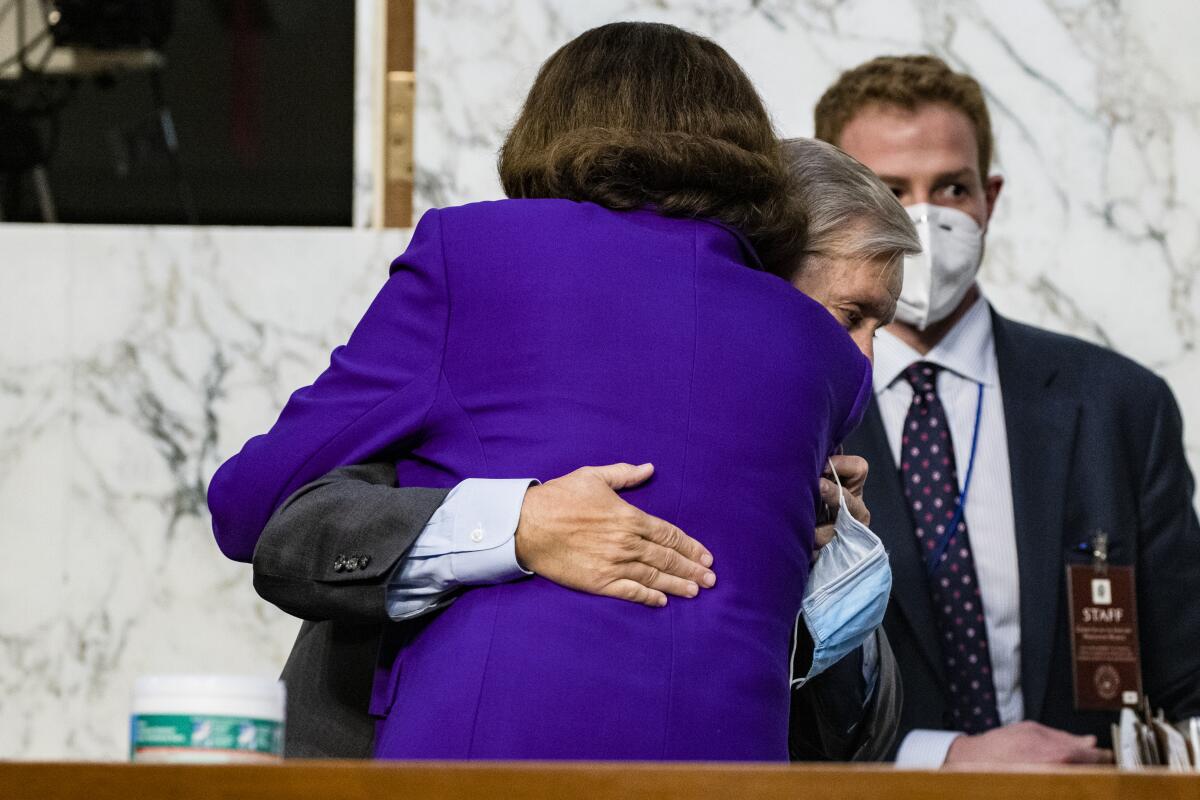Feinstein’s Senate role is at issue as Democrats fume over her committee performance

- Share via
WASHINGTON — California Sen. Dianne Feinstein walked into this week’s Senate hearing for Supreme Court nominee Amy Coney Barrett fully aware of Democrats’ concerns that she wasn’t up to leading their fight against Republicans’ rush to seat yet another conservative justice.
By the end of the week, however, Feinstein had given her opponents only more incentive to try to push her from her role as the Senate Judiciary Committee’s senior Democrat.
“Mr. Chairman, I just want to thank you,” the 87-year-old Feinstein, a Senate institutionalist, told Republican Sen. Lindsey Graham of South Carolina on Thursday, at the end of the four-day hearing. “This has been one of the best set of hearings that I’ve participated in, and I want to thank you for your fairness and the opportunity of going back and forth. It leaves one with a lot of hopes, a lot of questions and even some ideas — perhaps some good bipartisan legislation we can put together to make this great country even better.
“Thank you so much for your leadership,” she added. When the televised hearing ended, she and Graham shook hands and hugged.
Within hours, enraged progressive groups called for Feinstein to either resign or step down as the highest ranking Democrat on the committee, saying she had undercut Democrats’ argument that the hearing was all but illegitimate so close to a presidential election.
Polls have shown that a majority of Americans believe the winner of the election should fill the seat left vacant by the death of Justice Ruth Bader Ginsburg. Meanwhile, Republicans prominently featured Feinstein’s comments and the hug with Graham in digital ads and news releases.
Ilyse Hogue, the president of NARAL Pro-Choice America, in a statement Friday called for a new committee leader because Feinstein had “offered an appearance of credibility to the proceedings that is wildly out of step with the American people.”
“It’s time for Sen. Feinstein to step down from her leadership position on the Senate Judiciary Committee,” said Brian Fallon, executive director of the liberal group Demand Justice, which says it’s spending $10 million to oppose the Barrett nomination. “If she won’t, her colleagues need to intervene.”
No such move is likely soon; for Democrats, it would be an unhelpful distraction ahead of the election. Yet the issue of whether Feinstein, who favors bipartisanship and Senate tradition, is the right person to lead Democrats on the Senate Judiciary Committee is not going away. It will become all the more pressing if they win control of the Senate, putting Feinstein in line to be the committee’s chair.
Whether progressives’ pressure is enough to coax Senate Democrats to abandon the seniority tradition and toss Feinstein aside is far from certain. Feinstein has been a longtime target of progressives, including during her 2018 campaign, when she urged voters to return her to Washington for a fifth six-year term so she could become the powerful Judiciary Committee chair.
She would be the first woman to lead the committee. Democratic Senate aides say that chance at history, and the fact that the next three most senior Democrats on the committee are white men, weighs on any consideration of whether to prevent Feinstein from becoming chair.
As it happens, Feinstein was the first woman appointed to the committee nearly 28 years ago, after the backlash against its members — then all male — for their perceived mishandling of Anita Hill’s sexual harassment allegations against Clarence Thomas during his 1991 confirmation hearing for Supreme Court justice.
Democratic senators murmur their concerns to reporters, and to one another, about whether Feinstein is willing or capable of countering Republicans, who for years have aggressively maneuvered to fill the judiciary with young, conservative judges or to block Democratic nominees. But no Senate Democrat has been willing to say as much publicly. And though some Democrats have privately shared their concerns with the party’s Senate leader, Sen. Charles E. Schumer of New York, it’s not clear that any have spoken to Feinstein.
The senator told Politico she was “surprised and taken aback” to learn this month that some colleagues had concerns. When asked for an interview, Feinstein’s staff referred The Times to a statement issued Thursday, in which she said she planned to vote against Barrett.
“The Senate is structured so the majority had absolute control over this process,” Feinstein said in the statement. “When Republicans signaled they’d move ahead in the face of all objections, the only thing we could do was show this nominee would radically alter the court, and we accomplished that.”
In her 50 minutes of questioning Barrett, Feinstein did criticize Republicans for moving immediately after Ginsburg’s Sept. 18 death to confirm a new justice before the election. She also praised Barrett’s children for sitting quietly and asked for an introduction. She pressed Barrett repeatedly for her views on abortion rights, the constitutionality of the Affordable Care Act, gun control and upholding Supreme Court precedents, and she seemed frustrated at Barrett’s non-answers.
But at another point she said she was “really impressed” by Barrett’s explanation of “severability” — the question of whether a provision of law found to be unconstitutional can be “severed,” so the entire statute doesn’t fall; that issue could be crucial to the pending case against Obamacare.
As Feinstein indicated, Democrats can do little to stop Republicans from installing Barrett, one of the most conservative Supreme Court nominees ever and avowedly antiabortion, on the high court. At most, they can use procedural tactics to delay a Senate confirmation vote by a few hours or a day. Republicans aim for a Senate vote by Oct. 26.
With Barrett poised to create a 6-3 conservative majority on the court, progressives wanted Democrats to forcefully make the case against her and to engage in delay tactics, including attempts to shut down committee proceedings.
Outside the hearing room there were protests and arrests for obstructing Congress. Inside, where protesters were barred because of pandemic-related restrictions, there were no raised voices from Democratic senators, no motions to adjourn.
Republicans on Thursday easily blocked Democrats’ move to indefinitely postpone the proceedings, after a lengthy but mostly congenial exchange in which Democrats lodged their objections.
Sen. Sheldon Whitehouse (D-R.I.) warned Republicans that Democrats will play by the same rules if they win control of the Senate in November.
“Don’t think when you have established the rule of ‘because we can’ that — should the shoe be on the other foot — you will have any credibility to come to us and say, ‘Yeah, I know you can do that, but you shouldn’t,’” Whitehouse said. “Your credibility to make that argument at any time in the future will die in this room and on that Senate floor if you continue.”
But whether Feinstein would follow through with that threat is what has progressives, and some Democratic senators, concerned.
Feinstein isn’t a rabble-rouser and never has been. She has clashed repeatedly in past years with progressives who have demanded that she be more confrontational.
For example, Feinstein has decried Republicans’ abandonment of a century-old Senate practice that allows a senator to essentially veto a judicial nominee from his or her state by declining to return a “blue slip” — a permission slip of sorts, so called for its color — to the Judiciary Committee chair. Yet she has been unwilling to commit to following Republicans’ lead if she becomes chair.
And that concerns Democrats. They fear that if Democratic nominee Joe Biden becomes president, Republicans will withhold their slips to prevent him from filling judicial vacancies — just as they did to block a number of President Obama’s nominees.
More to Read
Get the L.A. Times Politics newsletter
Deeply reported insights into legislation, politics and policy from Sacramento, Washington and beyond. In your inbox three times per week.
You may occasionally receive promotional content from the Los Angeles Times.











